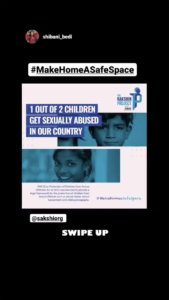The ongoing pandemic requires people to stay at home to ensure safety, but unfortunately for some, home is perhaps the least safe place they could be
The prolonged lockdown has seen an increase in incidents of child sexual abuse along with domestic violence. Considering that over 90% of abuse is typically perpetrated by people known to the child, with the lockdown being extended gradually, children living with abusers are facing a nightmare.
Childline saw a 50% increase in the number of calls received within the first 11 days of the lockdown. It has received 3 lakh calls since the lockdown began.
While there is a lack of access to intervene in most situations, as NGO workers do not fall under the category of essential services, several organisations are going online to increase awareness about making the home a safe place.
“What is happening now in this situation of lockdown is that when people are being cooped up in confined spaces, there is no outlet or safe space for the rising frustration due to uncertainties that are growing outside, be it financial, social or health. If you look at sexual abuse, it is the contest of power exercised by a few on the bodies of those vulnerable and dependent. There are these frustrations and anxieties coming out where there is no exit or intervention possible by any external support system,” explains Smita Bharti, Executive Director of the rights-based NGO – Sakshi.

Launching a digital campaign #MakeHomeASafeSpace, Sakshi is working towards preventing child sexual abuse. It works for communicating the importance of an accountable adult community, which is alert, informed and vigilant to secure their homes against potential abuse of children.
Bharti feels that it is critically important right now to spread awareness in this lockdown. Their model is quite simple – ‘Na karenge, na karne denge.’ (We will not do, or allow others to do). The visual campaign has been rolled out across all social media platforms and addresses the spike in child sexual abuse cases and the demand for child pornography.
Sakshi has adapted its offline education program to an online model wherein they reach out to students through webinars. “The idea of reaching out to youth between 18 to 22 years is really simple. Each student we are reaching and educating to be a preventer has a family. Each of these students is tasked with a simple action. Each student sensitises two others, one older and one younger family member,” says Bharti.
Another grim aspect is a significant increase in child pornography. A report by India Child Protection Fund called ‘Child Sexual Abuse Material in India‘, shows a steep rise in the demand for child pornography during the lockdown. Citing data from Pornhub, there has been a substantial increase of 95% in their traffic and a spike in search for words like ‘child porn, ‘sexy child’ and ‘teen sex videos’.
Drawing attention to this alarming rise in online child porn consumption and child sexual abuse, Kailash Satyarthi Children’s Foundation (KSCF) has also launched its campaign, #KeepChildrenSafeAtHome.
They have formed a coalition of over 100 civil society organisations who have joined hands for a pan-India campaign to protect children from sexual exploitation at homes and in the virtual world. It talks about how a majority of children end up spending their time online, making them more vulnerable to sexual predators lurking in the virtual world.
The online campaign is running on various social media platforms with the aim to spread awareness on the safety of children inside homes while at the same time highlighting the fact that over 93% of child sexual abusers are known to the victim.
KSCF has also launched a Virtual Volunteer Programme where one will go through an orientation and then engage in a series of activities to fight for child rights issues such as child trafficking, child labour, child marriage and child abuse. They recently hosted their first webinar for the virtual program which was attended by 83 volunteers. These volunteers have put together artworks and writings for the cause which are on display in their blog.
Not only Facebook and Twitter, these groups are also making use of TikTok to drive home their point. NGO Chetna is sending TikTok messages to spread the message and raise awareness, along with their Facebook posts.
While there are several helpline numbers being circulated along with the increasing spread of awareness, a huge number of cases remain unreported. “Only 50% of the cases get reported because our society is governed by very strong values of denial. Most people do not want to accept that it is happening in the family. Because there is so much shame associated with anything sexual and because of this stigma, it is very difficult to penetrate a family unit,” explains Bharti.
Talking about the root causes of the issue, Bharti feels that punitive punishment is not the only answer. “We also need to address the root causes of where this behaviour is coming from and start addressing sex education and create conversations regarding this.”





